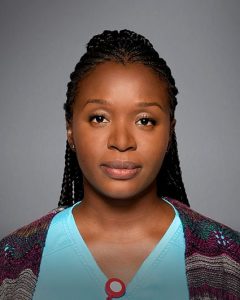
It is not uncommon to have American television sitcoms explore immigrant identities and ways of life. Such shows as Fresh off the Boat, Jane the Virgin, Master of None and The Mindy Project successfully used humor to shine the light on stereotypes, challenges and successes of first and second generation immigrant families in America. But it was not until Chuck Lorre’s Bob Hearts Abisola ( which airs Mondays at 8:30PM EST on CBS) did such a searchlight beam on any African nation. It was our pleasure to sit down with the star, Folake Olowofoyeku, who plays the main character, the strong-willed Nigerian nurse, Abisola, in the hit show, to discuss her life, the show, her future and her efforts to help Nigeria survive COVID-19 pandemic.
Folake was born in Nigeria, the youngest of twenty children. Her early education was all in Nigeria where she attended several boarding schools before moving to the United States at the age of 18. She was named after the first female Senior Advocate of Nigeria, Chief Folake Solanke (born 29 March 1932). Her parents’ expectation was that she would follow in the footsteps of the great lawyer and become another legal luminary. But Folake knew at an early age that she needed to chart her own course if she was to be self-fulfilled personally and professionally. Folake’s amazing story is one of determination, defiance and triumph. We will let her tell you the story herself in the interview that follows. But please support Folake’s COVID-19 cause by going to www.one.org and signing the petition. Enjoy the story.
NPM interview with Folake Olowofoyeku
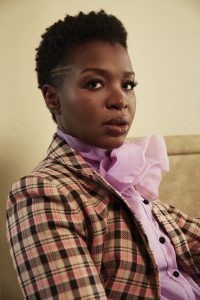
NPM: Folake, thank you for speaking with us today. We have followed your career and have been waiting for this interview. Glad you could be with us?
FOLAKE: Thank you so much for having me. I read about the Nigerian Parents Magazine on your website. I like your articles. Very well written.
NPM: Excellent. Thank you. Let’s start by asking where you reside at the moment:
FOLAKE: I’m in Los Angeles. California?
NPM: All right. Let’s jump into why we are here. We’ve been waiting for this interview for a long time. We’re big fans of your work. So, thank you for what you are doing. We have watched every single episode of your show.
FOLAKE:, I’m happy to hear that. You know, they say Nigerians are hard to please, so it warms my heart that you like my work. I really appreciate that.
NPM: A little about the Nigerian Parents Magazine and what we do. We started the magazine for several reasons. We recognize that there are young Nigerians in the Diaspora doing incredible things, especially second generation Nigerians who are high-flyers in sports, academic and other disciplines. They are doing great things, which means that their parents are doing something right. But there are others who still struggle. So, we wanted to establish the magazine to provide tidbits to parents based on what we glean from those who are successful. The second reason is that the stories of these Nigerian achievers are really not being told by the mainstream media in a way that compliments the achievers and Nigeria.
FOLAKE: Yes, I read that on your website and I agree with you. That was one of the things that drew me to the interview. It drew me to your cause. Seeing that on your website is powerful, and, like I said, I agree. It is important that we highlight the work that Nigerians are doing in the Diaspora because it encourages more of the same.
NPM: Thank you. So, you were born in Nigeria. One of the things that fascinates people when they read about you is that you are the youngest of 20 children. Could you tell us what it feels like growing up in such a large family?
FOLAKE: What is it like? To be honest, a lot of times I felt like an only child because most of my siblings could have been my parents. They were much older than I was. So, I only grew up in the house with my immediate brother and we weren’t extremely close. But I did know that there was this extension of my family that existed and people were really astonished when they heard about it. But it was a bit foreign to me because I didn’t feel like I really had any of the benefits or the pros and cons that come from being from a large family. I didn’t really experience it.
NPM: Okay. And what part of Nigeria are you from?
FOLAKE: I was born in Lagos and raised in Lagos.

NPM: Folake, we heard that it all started when you came for a summer vacation in New York? You enrolled yourself in theatre school and it took off from there. Why not law, medicine or politics. Why theatre?
FOLAKE: Well, the plan from my parents was for me to study law. I was named after the first female Senior Advocate of Nigeria – Folake. So their plan for me was that I would also become an attorney. But I just couldn’t resign myself to that. It didn’t feel like that was my calling at all. I felt strongly called to the arts, music especially. I had no outlet in Nigeria. I just remember begging for guitar lessons growing up. And even though my father introduced us to classical piano growing up, that stopped when I was still pretty young. So moving to New York, I was supposed to be in the United States on vacation. I heard they had stolen my results in Nigeria. Is it Jamb or WAEC? I forgot what it’s called. I think they changed the name at the end of my secondary school. But I heard they stole my results and I told my mom that there was no way I would go to school there. I threatened her that I would never go to school. I would never finish school if I didn’t stay here. Because I was acting up she agreed.
The plan was to study economics, get my degree in economics and then go to law school. I started on economics like a dutiful child. I enjoyed economics, but I just couldn’t see myself sitting in an office for the rest of my life. It just wasn’t my thing. It just didn’t feel right. And somehow I ended up in the theatre department. My parents were specifically opposed to music. But I figured theatre would be an easier pill for my family to swallow, as opposed to music. So I think I was going into theatre arts to try to find a way to get into music. That was always my end goal. And that’s how I ended up in the theatre department. It was a means to an end.
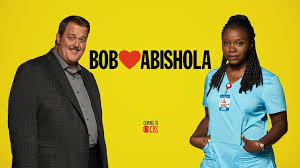 NPM: That’s a great story. So, being Nigerian Parents magazine, our bias is always towards parenting and upbringing. But we cannot wait anymore to talk to you about your hit show Bob Hearts Abisola. The show is unbelievable. That Abisola character, how in the world did you develop into that character? How much is that character different from you in real life?
NPM: That’s a great story. So, being Nigerian Parents magazine, our bias is always towards parenting and upbringing. But we cannot wait anymore to talk to you about your hit show Bob Hearts Abisola. The show is unbelievable. That Abisola character, how in the world did you develop into that character? How much is that character different from you in real life?
FOLAKE: I’m not like Abisola. Not at all. Fundamentally, we have a lot of similarities since we are both Nigerians. We are both Yoruba. Both were raised in Nigeria. I tried to place her in a more rural part of Nigeria. Not a big city like Lagos. You can assume maybe like Ibadan or somewhere in Ilesha. That’s where I wanted most of her formative years to have occurred. And I reflect that in her accent. So we have those things in common. But in terms of how we carry ourselves in the world and our views on life, we differ very much. That’s why it’s interesting playing her because I kind of want to let loose a little bit. But I have created her so very specifically. I try to find opportunities within the script to have fun with it.
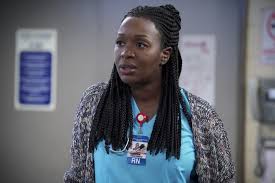 NPM: It’s amazing talking to you. Listening to your accent, it obviously is not reflecting the same accent that Abisola has in the show. And yet you play that so well that any Nigerian watching the show will say “yes, that’s my girl. That’s a Nigerian girl right there”.
NPM: It’s amazing talking to you. Listening to your accent, it obviously is not reflecting the same accent that Abisola has in the show. And yet you play that so well that any Nigerian watching the show will say “yes, that’s my girl. That’s a Nigerian girl right there”.
ABISOLA: Thank you. I obviously grew up speaking with a Nigerian accent. My time in different parts of the world has influenced the way I talk now. But when I get back home or when I am with my friends from boarding schools, who are out here in America, the accent completely changes again. Abisola can’t really talk the way I speak when I speak to my friends because then we’ll need subtitles. It’s a very delicate balance of all the things that are needed to create her speech. I’ve considered a lot of things like where she grew up, where she is from, how much time she spent in other parts of the country, our audience members being mostly American, and having to be intelligible and all of that.
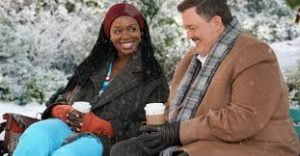 NPM: The show’s done very well and we can’t stop watching. Love it. What is your favorite episode so far?
NPM: The show’s done very well and we can’t stop watching. Love it. What is your favorite episode so far?
FOLAKE: There are a few episodes that come to mind. It’s hard to remember all of them now. I really enjoyed the “Whacking a Mole” episode because it was more physical. I liked playing around as Abisola, moving around and not being so stiff with her. I really enjoyed that. And then, I think the scene…. I think it was a really sweet moment – the scene where she brings ice cream to Bob. Ice cream for breakfast, I think was the name of that episode. I kind of like the fight… I like the fight between Chukwuemeka and Bob. Yeah. I like all the episodes where Abisola gets out of character, where she is excited to do something, either out of anger or happiness.
NPM: Yeah, I think our favorite is the one where you talk about “Nigerians don’t do stupid things. That was really funny.”
FOLAKE: Thank you. Nigerians don’t do useless things.
NPM: In our minds, you have single-handedly done more for the image of Nigeria than most of our diplomats are able to do. You have portrayed Nigeria in good light. And shortly after one of those episodes, I think it was the one where you said that Nigerians don’t do useless things, Fareed Zakaria of CNN did a short documentary on the ban on Nigeria. In that he praised Nigerians to high heavens. People immediately started referencing your show. What is the challenge in portraying Nigeria in such light? Do you sometimes feel like you are carrying the weight of the country on your shoulders, given all the negative press that Nigeria gets all the time?
FOLAKE: No, I don’t allow myself to feel any pressure. It’s just not possible for me to carry the weight of Nigeria on my shoulders. It’s just not possible. All I can do is the little that I can by living authentically and being passionate and being kind, and just being the best version of myself. And so that’s what my focus is on, whether it’s playing Abisola or anything else that I choose to embark on next. All I can do is be true to myself. I can’t think about carrying Nigeria on my shoulders. I can say that whatever I do, I will at least strive to make sure that everything I’m working on I do to the best of my abilities. And considering I’m not perfect, I’m not going to get it right all the time. I have to allow room for that. If not, I think it would be very dangerous. I don’t think about carrying Nigeria on my shoulders because I don’t think it’s realistic. All I can do is what I’m doing and what I’m going to continue to do, which is working as hard as I can to fulfill my dream and trying to create a better life for people I meet along the way. But that has to all be tied to me living authentically. So right now, that authenticity is wrapped around Abisola. But I’m sure there are going to be different other characters that come up.
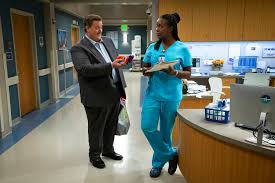 NPM: You have a few Nigerians working on the show. For example, Gina Yashere, Tony Okungbowa, Shola Adewusi, Bayo Akinfemi and so on. What are the challenges you face as those playing Nigerians on a hit show? Is there a cultural challenge that you guys face in doing this?
NPM: You have a few Nigerians working on the show. For example, Gina Yashere, Tony Okungbowa, Shola Adewusi, Bayo Akinfemi and so on. What are the challenges you face as those playing Nigerians on a hit show? Is there a cultural challenge that you guys face in doing this?
FOLAKE: Well, Bayo and Tony, I believe, were both raised in Nigeria. Bayo is also from Osun state like myself. Shola and Gina were both raised in England. I think Shola spent some time in Ilesha growing up. But I don’t know if they consider themselves Nigerian or Nigerian-British. I just want to clarify that. You’d have to, I guess ask them in addition and do some research on what their preference is. We’ve all spent a lot of time in America and England, respectively. So we are culturally adjusted. I can only speak for myself, but I don’t think that there are any cultural issues that we’re navigating within our world of creating the show. I think everyone is really open. The producer Chuck Lorre, the directors, everyone is really invested in making this a very authentic portrayal. So, for instance, Bayo speaks the best Yoruba on set. So, if there is something we feel like it needs to be translated accurately, I tell people to speak with Bayo, that he should be our go-to person. And then if we’re having a particular scene and we’re gonna have Nigerian food, the prop master talks to us, the designers talk to us about what things it is realistic to have on set. And so we’re all contributing to making sure this story is told properly.
NPM: Have you been in any Nigerian movie?
FOLAKE: I tried. You know, when you’re trying to make it as an actor, you are open to anything and anywhere they can come from. A few years ago, I considered moving back to Nigeria, especially to pursue music again. And obviously my resume is specific towards acting. So, I went with all that in hand and I made my rounds and talked to a few people. It was just so hard to get people focused or on the same page. Just believing in what I had to offer was very difficult, especially with music. I really had a hard time getting a team together. So, it wasn’t successful. Eventually I was referred by a couple of lawyers. My mother’s lawyer referred me to one of his friends who was an entertainment lawyer. He in turn put me in touch with Amaka Igwe who has since passed away. We started working on a project together. It was gonna be called VIP. And we shot most of it actually. I was playing the lead on that and unfortunately, Mrs. Igwe passed away before we had an opportunity to complete it. So that was my one venture into Nollywood. I was definitely trying. With the right project and the right story, I would love the opportunity to go back home. I have a team of musicians that I work with right now, and I’m creating opportunities in that arena. My writing partner and I have put together one of the songs for the show. The song that Abisola was singing in the shower, we wrote that.
NPM: Yes, there is a short song you posted on Twitter, we listened to it.
FOLAKE: Happy happy?
NPM: Yes, Happy happy. It is quite authentic and that is what sets you apart.
FOLAKE: Thank you. Thank you. I’m also working on new music. I have a ton of music that I recorded when I was in Nigeria after Christmas, and, I’m working on putting it out. Thank you. I appreciate that.
NPM: We will watch out for that. So you’re winning all these awards and we see more coming your way. What should we expect in the future?
FOLAKE: Thank you. Amen. Your lips to God’s ears. My realm is sci-fi fantasy adventure. So, if I had my choice, I would be doing a lot of that. And, as far as acting goes and making music, I play electric guitar. And, as soon as I get a solid team together, you guys will be hearing a lot more from me musically.
I’m also working with some One Organization (www.one.org) especially during this pandemic. I am especially trying to find areas in which I can help back home in Nigeria. I am not quite sure how things are progressing on ground as far as policies and help relief. I feel like partnering with One gives me an opportunity to be involved in just making sure Nigeria comes out of this ok.
NPM: Great. Let’s switch gears and talk about COVID-19. We know you are working very hard to bring awareness to people about what they can do to stay safe, especially Nigerians. So tell us about what you are doing, what results have you seen so far on how Nigerians Parents, as an organization and a magazine, can help. How do we collaborate with you to send your message across and make sure that it gets to the people that you want it to get to?
FOLAKE: Well, I think highlighting One Organization will be extremely helpful. Right now they have the petition going on on their website. What signing up the petition does is it gives people ammunition to go to different governments and say, hey, this is how many people who are interested and concerned about what’s going on in the world with the pandemic and we would like you to allocate resources, to have professionals, to make sure that the most vulnerable people in society in each of these countries are doing okay and cared for. I’ve spoken to a couple of people that are on the ground in Nigeria. They seem very passionate and they have a clear idea how to achieve some sort of positive change in the healthcare system in Nigeria. So I trust them. But I think if people can go on their site, it’s called… www.one.org, and sign the petition, that would be really helpful. So, if you can add that link to your article as well, and encourage your followers to sign up, I think that’s a good first step. And then in the coming days, I am going to be partnering with them in other efforts to raise awareness and have people kind of have a goal on what to do during this time. And I hope we can get to a place where we are also providing equipment and items that can help safeguard people during this time. And also obviously, I wonder how people make a living during this time, especially when we know our government isn’t always as concerned about the citizens as they should be. So just finding ways to be helpful and help people on ground without obviously being taken advantage of. That will come in the next couple of days. I’ll share that on my social media platform when it becomes available. But for now, going on their website and signing the petition is really helpful. It’s www.one.org.
NPM: We’ll be happy to link to it on our website. Now let’s talk about all these millions of Nigerians who are looking up to you as a role model. We know that a lot of young people are doing that, they want to follow your footsteps and do what you’re doing. What are some words of wisdom or pitfalls to avoid that you may want to put across to them?
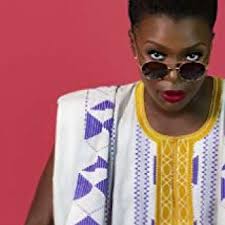 FOLAKE: It’s not my goal to be a role model. Again, it’s similar to the idea of carrying Nigeria on my shoulders. All I can do is live authentically. I’m aware that people are drawn to Abisola, the positive depiction that they see on television. But I’m also not Abisola. And again, we don’t have a lot of similarities. So, I’m grateful that she could be inspiring. I hope that everything that I do sparks positivity and creativity in people, but I can’t focus on just that. My advice to the younger people then would be the same … to just live authentically. As long as you’re not hurting yourself or anybody else, you should believe and trust your intuition. I think we’re all put on this earth with a divine purpose. And it doesn’t always align itself with the people that we are around. We know that Nigerians can be very opinionated and it’s important to know that you’re not here to be uniform or to follow anybody else. You’re here to fulfill your dreams and goals and to make yourself happy. That would be my advice to them. Today, I’m playing Abisola. A few years ago, I played a trans character on Transparent. The roles I’m playing may not always resonate with a majority of the people. But as long as I feel good about it, I think and I’m not hurting anyone. Being true to myself, I think is the best policy.
FOLAKE: It’s not my goal to be a role model. Again, it’s similar to the idea of carrying Nigeria on my shoulders. All I can do is live authentically. I’m aware that people are drawn to Abisola, the positive depiction that they see on television. But I’m also not Abisola. And again, we don’t have a lot of similarities. So, I’m grateful that she could be inspiring. I hope that everything that I do sparks positivity and creativity in people, but I can’t focus on just that. My advice to the younger people then would be the same … to just live authentically. As long as you’re not hurting yourself or anybody else, you should believe and trust your intuition. I think we’re all put on this earth with a divine purpose. And it doesn’t always align itself with the people that we are around. We know that Nigerians can be very opinionated and it’s important to know that you’re not here to be uniform or to follow anybody else. You’re here to fulfill your dreams and goals and to make yourself happy. That would be my advice to them. Today, I’m playing Abisola. A few years ago, I played a trans character on Transparent. The roles I’m playing may not always resonate with a majority of the people. But as long as I feel good about it, I think and I’m not hurting anyone. Being true to myself, I think is the best policy.
NPM: Before we wind up this interview, we would like to know if there is anything else you would like people to know about you that we have not asked you about. We want to give you a blanket opportunity to share with our audience?
FOLAKE: No, I don’t think so. I think you’ve been really thorough and very good. Nothing else.
NPM: Let’s end with a couple of Folake trivia then. What is your favorite Nigerian food?
FOLAKE: It fluctuates. It depends on what I’m in the mood for. Lately, I have been eating a lot of ewa agoyin and jollof rice. Before that, I was eating a lot of yam porridge. And before that, I was eating amala and ewedu. And even before that I was doing garri and okro. It moves around. I do everything, I think. Yeah, I frequent some of the Nigerian restaurants in LA.
NPM: What do you do to relax? You have a lot of work that you do. You are a busy person, what relaxes you?
FOLAKE: What relaxes me? Um, massage. I order a lot of in-home massages. And, um what else? I started riding my bike lately. But I feel my go-to is massages. Yeah, that’s top on my list.
NPM: Who is your favorite Nigerian musician?
FOLAKE: That is a tough one. How do I give you just one? Right now I’m really into Chris Daniel. I think he is really good. With the right backing, he would be unstoppable. He is doing some really great things. I think he is talented. So is Teni. I also like Teni. Asa got me through a difficult time with her first album. So I’m always appreciative of her.
NPM: Folake, we want to thank you for taking the time to talk to us. It was very nice speaking with you.
FOLAKE: It has been a pleasure talking to you both. Thank you for inviting me and for what you do. Okay. Take care guys.


This Post Has 3 Comments
I love Bob Hearts Abishola. It’s a show, I believe, that has shed light and corrected some misconceptions about Nigeria. And Abishola plays her role very well. It’s a show I don’t like to miss even though the network does a lot of re-runs. However, I would love to see more Nigerians play roles that depict Nigerians. Good comedy though.
Well said, Patrick. Thanks.
We congratulate Folake and all Nigerians on the show being renewed for Season 2. Great job Folake!!!